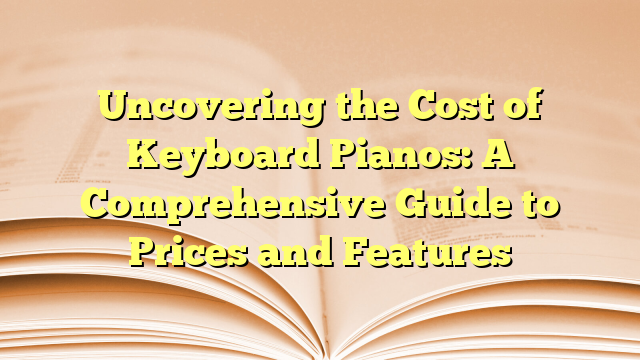So, you're thinking about buying a keyboard piano? It's a great move! Whether you're a beginner looking to dive into the world of music or an experienced pianist wanting to expand your skills, a keyboard piano is a fantastic investment. But one question that's probably on your mind is, "how much does a keyboard piano cost?"
Well, I'm here to break it down for you. In this article, we'll explore the factors that determine the cost of a keyboard piano. From brand and model to features and size, we'll cover it all. By the end, you'll have a clear understanding of what you can expect to spend on your new musical companion. So, let's get started, shall we?
Factors that Determine the Cost of a Keyboard Piano
Now that we've established the importance of a keyboard piano in a musician's life, let's delve into key factors that influence its cost. Understanding these aspects will give you a solid foundation for judging if a particular keyboard piano is worth the price tag.
First off, the brand of the keyboard piano has a pronounced impact on the price point. Top brands like Yamaha, Casio, and Roland are known for their exceptional sound quality, durability, and innovative features. They often price their keyboard pianos higher due to these factors. That said, there are lesser-known brands that offer decent quality keyboards at a more accessible range.
The model of the keyboard piano also plays a crucial role in determining its cost. Older models are typically less expensive compared to their newer counterparts. But remember, newer models often come with advanced features and enhanced capabilities like improved sound systems or richer instrument voices.
In addition, the features of the keyboard piano can drastically change the price. Keyboards with numerous instrument voices, MIDI compatibility, built-in speakers, and digital screens are likely to cost more. Of course, if you're a beginner or not planning on using these features, you can look for simpler models with just enough features to suit your needs.
Lastly, the size of the keyboard contributes to the cost as well. A full-sized keyboard piano with 88 keys and a weighted action will cost more than a smaller, more portable keyboard.
In summary:
- Brand
- Model
- Features
- Size
These are the four major contributing factors that determine the cost of a keyboard piano. By having a keen eye for these elements during your hunt for the perfect keyboard, you are sure to secure a deal worth every penny.
Brand and Model: How They Affect the Price
When seeking to understand what determines the cost of a keyboard piano, you simply can't overlook the importance of brand and model. Nowhere is the adage "You get what you pay for" more apparent than in the world of keyboard pianos. So what's the scoop?
It's the brand and model that often dictate the price point. Market leaders like Yamaha, Casio, and Roland produce models that are renowned for their quality. They've attained a reputation over the years for delivering top-notch performances. Consequently, these premium brands command higher prices for their keyboard pianos. Yet, it's not just about the name etched on the keyboard. The specific model plays a crucial part too.
Think about it this way: Brands like Yamaha or Casio offer a vast range of models, from entry-level to professional-grade pianos. These different models come with varied features, build quality, and of course, pricing. More advanced models incorporate sophisticated technology, like weighted key action or advanced sound engines, making them cost significantly more.
Don't be surprised to find a price difference of hundreds or even thousands of dollars between beginner and pro models from the same brand. An entry-level Yamaha keyboard piano might cost around $200, while their high-end model could fetch up to $2000 or more.
The important thing to remember is that pricier doesn't always mean better for you. As a music enthusiast, it's crucial to understand your needs and match them with the right brand and model. If you're a beginner, an advanced professional-grade piano might offer more features than you need, and it will certainly have a higher price tag. On the other hand, if you're a seasoned pianist, investing in a high-end model can be worth every penny for the enhanced musical experience it provides.
The table below presents a simple comparison among different brands and models:
| Brand | Entry-level Model Price | High-End Model Price |
|---|---|---|
| Yamaha | $200 | $2000+ |
| Casio | $150 | $1500+ |
| Roland | $300 | $2500+ |
While the cost of a keyboard piano extends beyond the brand and model, these factors undeniably have a significant impact on the price tag.
Exploring the Features: What Do You Get for Your Money?
To understand how brands justify their price points, let's delve into their features. Higher-priced keyboard pianos from top brands like Yamaha, Casio, and Roland typically come packed with a load of features that not only enhance the quality of sound but also the overall playing experience.
The type of keys plays an integral role in pricing a keyboard piano. Weighted keys that mimic the feel of an acoustic piano often drive up the cost. More advanced models also offer "graded hammer action" – a design mimicking traditional pianos where the bass keys have a heavier touch than the treble keys.
This dynamic doesn't just stop at hardware. Software integrated into these keyboard pianos is increasingly becoming a key determinant of price. The sound engine of a digital piano also influences the cost. Models powered by more realistic sound engines that utilize high-definition digital samples of acoustic pianos naturally call for heftier price tags.
Extra features such as an in-built metronome, a USB port, Mixing and Recording capabilities, and a large selection of built-in sounds are typical of high-end models.
Let's break down what you get for your money. Here's a table comparing the important features of entry-level models to high-end models.
| Entry-Level | High-End | |
|---|---|---|
| Keys | Semi-weighted | Fully Weighted, Graded Hammer Action |
| Sound Engine | Basic digital samples | HD digital samples & advanced synthesis techniques |
| Extras | Limited selection of built-in sounds & basic connectivity | Large selection of built-in sounds, advanced connectivity & other features |
Having assessed these features, it's evident that market leaders are often able to justify the high costs associated with their keyboard pianos. But bear in mind the golden rule of shopping - let your individual needs, and not just the price tag, guide your decision-making process.
Size Matters: How Size Impacts the Cost
When browsing through piano options, you've probably noticed that size plays a big part in determining cost. Keyboard pianos come in different sizes, from small portable ones to larger, professional-grade models. It's important to understand how size affects cost, as this can guide your purchasing decision.
Smaller, portable keyboard pianos often provide an affordable entry point. They're perfect for beginners who are just starting their musical journey. These keyboards typically have fewer keys, around 61 note keyboards instead of the full 88, cutting out some cost. However, they may lack advanced features such as weighted keys or graded hammer action seen in pricier models.
On the other hand, larger keyboard pianos come with a higher price tag. They're designed with more keys, encompassing the full 88 that you'd find on a traditional acoustic piano. What you're paying for is not just the extra keys, but the enhanced range of expression and the extra piano features. Advanced features like realistic sound engines, weighted keys, and graded hammer action often come standard in larger models, providing a fuller, richer sound which emulates the feel of a grand piano.
In addition, you also have digital grand pianos—this is where size greatly affects cost. These top-of-the-line models replicate the imposing size of a grand piano, requiring significant space. Aside from boasting a full range of keys and advanced features, they offer a luxurious design, adding a touch of elegance to any room.
So why does size matter so much? Well, it mostly comes down to two important factors: materials and technology. Larger keyboards need more materials, hence increasing the cost. As for technology, advanced features built into bigger keyboards enhance sound quality and keyboard response which translates into higher prices.
So, when making a choice, don’t just focus on the brand and model - your individual needs must guide your choice. Consider whether you need a portable piano, a full-size digital piano, or a digital grand piano. Weigh these options while keeping in mind the impact of size on cost. Another important factor to remember is the space you have available—don’t invest in a large model if you're short on space.
Budget-Friendly Options: Finding a Keyboard Piano within Your Price Range
Looking for a budget-friendly keyboard piano doesn't mean settling for less. In reality, some low-cost options might surprise you with their sound quality and abundance of features.
There's a common misconception that affordable keyboards fall short, but that's not the case. You just need to know where to look and what to consider. Here's some information on wallet-friendly keyboards that won't make you feel like you're boxing in the corners.
Beginners or those limited by space could find smaller, portable keyboards the perfect starting point. They're affordable and compact, making them ideal for those embarking on their musical journey. Here's a quick look at the cost of few sizes:
| Keyboard Size | Average Price Range |
|---|---|
| 25 keys | $50- $100 |
| 49 keys | $100- $200 |
| 61 keys | $100 - $350 |
Remember, smaller keyboards don't offer the range of notes found on a standard 88-keys piano. However, they're perfect for learning basic skills and practicing on-the-go.
For those seeking more advanced features such as weighted keys or a larger range of notes, keyboards with 76 or 88 keys are recommended. Yes, they'll set you back a bit more. But, you'll find plenty of them in the mid-range price bracket, from $200 to $1,000.
Keep in mind, you don't always need to break the bank to achieve better sound quality or bigger size. There are digital pianos replicating grand pianos available at a wide price range starting from $500 upwards. Though they don't quite capture the traditional grand piano's aura, they deliver a comparable experience at a fraction of the cost.
In short, the key to finding the right keyboard piano within your budget lies in identifying your needs and choosing the one that meets them best. Don’t rush, be patient, stay informed, and you'll find the perfect instrument that doesn't empty your pockets.
Conclusion
So you've seen that the cost of a keyboard piano can vary greatly. It's all about matching your needs with your budget. Whether you're just starting out or seeking advanced features, there's a keyboard piano for you. Affordable options don't have to compromise on sound quality or features. Remember, smaller keyboards are great for beginners or those with limited space. If you're after the full piano experience, keyboards with 76 or 88 keys or digital pianos replicating grand pianos might be your pick. The world of keyboard pianos is wide and varied, and the perfect one for you is out there. Happy hunting!
Harlan Kilstein began playing piano during covid with no piano background at all. He taught himself how to play learning what to do and what not to do.
Today he's an advanced intermediate player and can help you grow in your skills because he learned all this on his own.







